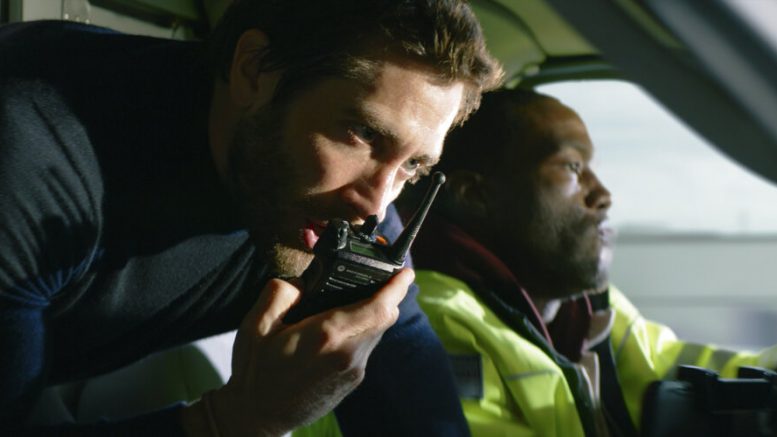The Associated Press
Of all the many things that go fast in Michael Bay’s pedal-to-the-metal retro action thriller “Ambulance” — the speeding EMS van, the army of police cars trailing it, Bay’s ever-swooping, whooshing camera — nothing goes by in more of a blur than the exposition.
Here is Will Sharp (Yahya Abdul-Mateen), a former Marine, on a frustrating phone call trying to get insurance approval for his wife’s life-saving surgery. He’s getting nowhere so, with a kiss for his wife (Moses Ingram) and toddler son, Will rushes across town — this is Los Angeles — to meet his brother Danny (Jake Gyllenhaal). They haven’t seen each other for some time but brief flashbacks to their childhood suggest a deep bond. Will tells him he needs money. Danny says he has a job, but Will would need to come with him now, this instant, to steal $32 million from a federal bank. Are you in? Well, are you?
Will goes from hold music to heist in under an hour — about the opening five minutes of Bay’s 136-minute film — and “Ambulance” doesn’t slow down from there. The robbery fails to go according to its hurried and haphazard plan, and, like in Michael Mann’s “Heat,” a bank-job-gone-wrong spills out onto downtown Los Angeles streets. In the melee, Danny and Will scurry through the sprawling building and its subterranean parking garage with a cop (Jackson White) as hostage. In a struggle, Will reluctantly shoots him. Seemingly boxed in with squad cars descending all around, they sneak through by stealing the ambulance that has just picked up the very same policeman. With a steely and highly professional EMT (Eiza González) in the back tending to his wounds, the brothers flee through Los Angeles in a daylong chase.
In the sirens of “Ambulance,” you can probably already hear the echoes of other movies. “Speed” and “Die Hard” are just a few lanes over from Bay’s film, which opens in theaters Friday, and so are some of the director’s own movies. “Bad Boys” and “The Rock” both get callbacks early on. It’s a little like a ’90s movie spirit is being resurrected. Bring forth the propulsive excesses of yesteryear!
So does that make “Ambulance” a retread of a familiar — and some would say thankfully increasingly obsolete — hyper-masculine mode of moviemaking? Or have we reached the point — amid more careful, IP-managed blockbusters — of nostalgia for implausibly scripted, testosterone-fueled action extravaganzas with the sound cranked way up?
Well, both are a little true. “Ambulance” pines for a visceral, breezily violent style of film that doesn’t slow down to ask too many questions. And while Bay’s film wouldn’t stand up to too much inquiry — this is a movie where a ruptured spleen is treated with a hairpin — it’s hard to deny its escapist panache. It has a gripping, gonzo glory — Bay knows just how far-fetched this sort of movie should be — and it’s paced by an abiding affection (and a lot of drone shots) for Los Angeles. Crisscrossed with the city’s freeways and art deco architectures, this is Bay’s “La La Land,” just with explosions instead of song-and-dance routines.
For Bay, and perhaps only Bay, “Ambulance” is a relatively small and contained film. Next to films like “Armageddon” and the “Transformers” movies, “Ambulance” was made for a surprisingly modest $40 million. The downside of this is that the director, as if nervous that the movie is lacking in scale, can’t stop sweeping his camera around at every moment. All of his showy, aggressive heightening of the drama has the inverse effect of never allowing the tension to take hold. With another filmmaker, there might have been a leaner, less hyperactive, B-movie version of “Ambulance.” (Scripted by Chris Fedak, “Ambulance” was, in fact, adapted from another, briefer film: Laurits Munch-Petersen’s 2005 Danish film of the same name.)
Bay, itching to shoot during the pandemic, made “Ambulance” early last year, and I think the movie’s kinetic energy owes something to that apparent impulse to go out, drive some cars real fast and make a movie. Maybe the film’s most unbelievable aspect is how empty of traffic the Los Angeles streets are. But for such a stunt-filled film, it feels off-the-cuff — in good ways and bad.
For one, I don’t think they ever quite figured out Abdul-Mateen’s character. How we’re supposed to feel about the brothers as antiheroes, also, is a little muddled given the amount of people their joyride appears to kill or maim. Still, there’s some clever playing around with morality. When the injured cop in the ambulance goes into critical condition, Will donates blood while the chase continues. If you were so inclined, you might even say that good and bad bleed together.
The freewheeling nature of the movie also gives some of the performers room to play. And many of the supporting players are very good, particularly Garret Dillahunt, as the police captain leading the manhunt with one eye always on his dog, Nitro. González (who’s quickly piling up a very automotive filmography with “Baby Driver” and the “Fast and Furious” spinoff “Hobbs and Shaw”) keeps the antic “Ambulance” grounded. But more than anyone, Gyllenhaal, as a cheerful, nearly unhinged thief in a cashmere turtleneck, is having a grand time. He’s the manic engine driving “Ambulance.”
“Ambulance,” a Universal Pictures release, is rated R by the Motion Picture Association of America for intense violence, bloody images and language throughout. Running time: 136 minutes. Two and a half stars out of four.




































